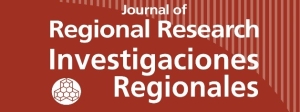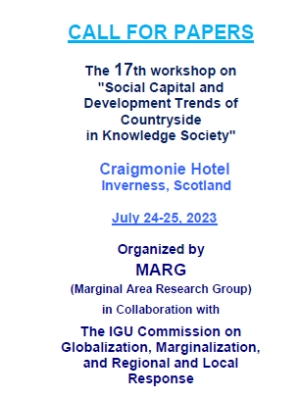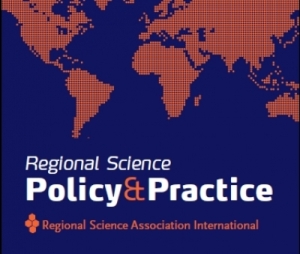RSPP Annual Paper Award
Elisabete Martins
Call for Submissions: PRSCO Award for Best Paper by a Young Regional Scientist
Call for Submissions
PRSCO Award for Best Paper by a Young Regional Scientist
The Pacific Regional Science Conference Organization (PRSCO) offers a Best Paper Award annually. The Award is aimed at encouraging young regional scientists within the Asia-Pacific region to participate in research within the PRSCO community and to achieve research excellence. PRSCO now invites submissions for the 2023 Award.
The Award will be made for the best submission to the PRSCO Best Paper competition by a young regional scientist, under the age of 35 (on December 31, 2023), who is from a PRSCO-relevant part of the world.
The Award rules can be found on the PRSCO web site.
Papers submitted for the Best Paper Award should be presented to 18th the PRSCO summer institute in Cambodia on June 13-14, 2023.
Eligible authors who wish to submit a paper to the PRSCO Best Paper competition should email a pdf copy of their paper to the PRSCO Executive Secretary, Soushi Suzuki, soushi-s@lst.hokkai-s-u.ac.jp, by no later than Thursday, April 27, 2023.
Papers will be assessed by a PRSCO Best Paper Selection Committee and the author of the winning paper is expected to be notified by June 1, 2023. The decision of the Selection Committee will be final.
Submissions should include a cover page with the paper’s title, the author’s full name, affiliation, and contact details. Award applicants should either: state that the paper is single-authored; or provide the name of the co-author(s), together with evidence that the applicant is the lead author and has contributed over 70 per cent of the paper’s content. The applicant should also affirm that they meet the Award’s age criterion.
http://www.lst.hokkai-s-u.ac.jp/~soushi-s/prsco/PRSCOAwards.html
Winner 2023 - Martin Beckmann Annual Award for the best paper published in Papers in Regional Science in 2022

The Martin Beckmann RSAI Annual Award for the Best Paper in Papers in Regional Science
Winner 2023

 RSAI has the great pleasure to announce that the jury consisting of Budy Resosudarmo (PRSCO), William Strange (NARSC), Isabelle Thomas (ERSA) and Rosella Nicolini, EiC of the journal chose the article:
RSAI has the great pleasure to announce that the jury consisting of Budy Resosudarmo (PRSCO), William Strange (NARSC), Isabelle Thomas (ERSA) and Rosella Nicolini, EiC of the journal chose the article:
Jhorland Ayala-García and Sandy Dall'Erba (2022) The Impact of preemptive investments on Natural disasters, published in Papers in Regional Science, Volume 101, Issue 5, Pages 1087-1103.
Motivation:
This study delivers a very original contribution to the current and relevant debate on the role of institutions and public policies aiming at contrasting the socioeconomic impact of natural disasters on citizens’ life. The authors implement a precise research strategy approaching physical geography to regional science. They exploit novel and original data combining satellite information with public finance data for Colombian municipality and propose different indicators for approximating the market and non-market losses of landslide-related events (associated with extreme rainfalls events due to climate change). The empirical analysis relies on a robust IV approach building on a very attentive selection of covariates fitting the proposed indicators. The conclusion is a direct message to institutions and policy-makers demanding effective measures to protect lives and assets of the most vulnerable population.
as the winner of the Martin Beckmann Prize as the best paper published in Papers in Regional Science in 2022.
Extended: PRSCO 2023 Abstract submission deadline: March 31, 2023
Dear PRSCO councillors and friends,
I am so happy to inform you that the abstract submission deadline is extended by March 31, 2023, PRSCO 2023 at Angkor Paradise Hotel, Siem Reap, Cambodia, 13-14 June 2023, as attached file.
https://prscocambodia.org/abstract-submission-form/
I am looking forward to meeting you at Angkor Paradise Hotel in Cambodia.
Kind regards,
Soushi Suzuki
PRSCO Executive Secretary
Hokkai-Gakuen University
Call for Papers and Special Session Proposals | 30th APDR Congress, July 19-21, 2023, University of Minho, Braga, Portugal
Call for Papers and Special Session Proposals
The APDR invites regional scientists, economists, sociologists, geographers, urban planners, policy makers, and researchers of related disciplines to participate in the 30th APDR Congress with the theme "Sustainability Development Challenges of Territories in Contexts of Uncertainties due to External Shocks and Risks" that will be held from 19th to 21st of July, 2023, at University of Minho (Institute of Social Sciences and Lab2PT), Campus de Gualtar, Braga, Portugal.
During the last years, the COVID-19 pandemic and, more recently, the war in Ukraine, following the decision of Russia to invade it, impacted deeply world economy and citizens daily life, particularly in some territories more exposed to the tourism industry or relying more on non-renewable energies and other production factors which the war turned scarcer or more expensive. No one knows yet when this international conflict can have an end. Besides, the international trade chain goes on suffering from the impacts of the pandemic, a phenomenon that is still without enough control in China. The need to enhancing the fight against global warming and climate change, as well as the continuous evolution of digital technologies, are also bringing some uncertainty to the markets, and it is hard to predict whose territories will be the winning and looser ones.
In this context, adopting more sustainable development strategies, social inclusive policies, more environmental friendly transport modes, commit more on innovation and entrepreneurship at regional and local levels, and adopting new governance models at the territories, aiming deepen democracy and give efficacy to the decision making process on the main issues affecting territories development, looks to be required.
The overall aim of this conference is to bring ideas, theoretical approaches and examples of potential solutions to territorial bottlenecks and social and development difficulties.
The call for papers and Special Session Proposals are open and your participation is very welcome!
Regular Sessions:
RS15 - Inequalities, Asymmetries and Socio-Territorial Cohesion
RS16 - Risk and Disaster Management: Vulnerability and Resilience in Adverse Contexts
RS17 - Active and Inclusive Mobility
RS18 - Effects of Multiple External Risks/Shocks on Islands
RS19 - Demographic Challenges, Migrations and Integration
RS20 - Natural Environment and Territories Development
RS21 - Energy Transition and Regional Development Policies
RS22 - Infrastructure, Housing and Inclusive Growth
RS23 - Networks and Cooperation and Territories Development
RS24 - Regionalization and Decentralization: the Necessary Reform of State Aiming at Deepening Democracy and Enhancing Territories Development
RS25 – Entrepreneurial and Sustainable Ecosystems
RS26 – Circular Economy in Regions and Cities
Deadline for Special Session proposals: April 15, 2023. Proposals should be sent by email to the secretariat of the Congress (apdr@apdr.pt).
Deadline for Abstracts submissions: May 15, 2023. Authors should submit their abstracts through online submission system by following the link https://cmt3.research.microsoft.com/APDR2023.
All information at the congress website: http://www.apdr.pt/congresso/2023 Looking forward to meeting you in Braga, Portugal!
The Organizing Committee and the Board of APDR 30th APDR Congress
NARSC March Update
|
|||||||||||||||||||||||||||||
|
The latest issue of Regional Science Policy & Practice are available! Vol. 15, No. 1, February 2023, Special Issue: Ukraine: Geopolitical Realities and Regional Development Perspectives
Special Issue:Ukraine: Geopolitical Realities and Regional Development Perspectives
ISSUE INFORMATION
ORIGINAL ARTICLES
The first two months in the war in Ukraine through topic modeling and sentiment analysis
Regional science knowledge needs for the recovery of the Ukrainian spatial economy: A Q-analysis
Human resources for regional development in Ukraine: A roadmap for forecasting and determining a regional training request
Modern approaches to Ukraine's regional development management
The impact of the Russian–Ukrainian conflict on Green Deal implementation in central–southeastern Member States of the European Union
Taxation as a tool of implementation of the EU Green Deal in Ukraine
Ukrainian context of sustainable development and the role of business in its achievement
War refugees from Ukraine in Poland – one year after the Russian aggression. Socioeconomic consequences and challenges
Shifting attitudes towards identity, borders and geopolitical choices: The case of Moldova
Analysis of the media discourse on the 2022 war in Ukraine: The case of Russia
Olga Brusylovska, Iryna Maksymenko
ERSA Monthly E-news - February 2023
|
Call for Applications for the Editorial Team: Investigaciones Regionales / Journal of Regional Research
Call for Applications for the Editorial Team
Investigaciones Regionales / Journal of Regional Research
Investigaciones Regionales – Journal of Regional Research is a highly respected journal dedicated to publishing top research in the field of Regional, Urban, and Territorial Studies. The journal is operated by the esteemed Spanish Association of Regional Science (AECR), which is a proud member of both the European Regional Science Association (ERSA) and the Regional Science Association International (RSAI).
This journal adopts a multidisciplinary approach and encourages submissions from a wide range of fields, including Economics, Geography, Sociology, Land Planning, or Political Science. Papers that contribute to the advancement of new ideas and methodological approaches, while also providing a high degree of originality and added value, are warmly welcomed. Such contributions serve to enhance the overall quality of the publication and further its aim of disseminating new ideas and promoting a deeper understanding of the field.
The review process of the papers submitted to the Journal follows international standards. All articles are appraised by the Associate Editors (members of the Editorial Team), applying criteria of scientific interest and quality, and requests at least two anonymous external reviews before deciding whether submissions are suitable for acceptance. The journal is published three times each year, providing ample opportunities for researchers to disseminate their findings and contribute to the broader body of knowledge in Regional, Urban, and Territorial Studies.
This letter is a call for new nominations for Associate Editors to enlarge our Editorial Team. The Associate Editors will have several important responsibilities, including selecting reviewers for submitted manuscripts, making final decisions regarding publication, and upholding the highest standards of integrity and scholarly inquiry. We welcome nominations from all disciplines within Regional Science, but we particularly welcome researchers within the fields of geography, sociology, political science, and business. By joining our Editorial Team, the new Associate Editors will help us maintain our journal's reputation as a premier publication in the field of Regional, Urban, and Territorial Studies.
Following approval of a nomination committee, the recommended editors are expected to start in Spring/Summer 2023.
Nominations received by March 31st, 2023, will receive full consideration. Inquiries may be made to investig.regionales@aecr.org.
Call for Abstracts | 17th Workshop on “Social Capital and Development Trends of Countryside in Knowledge Society”, Inverness, July 24-25, 2023
CALL FOR PAPERS
The 17th workshop on "Social Capital and Development Trends of Countryside in Knowledge Society"
Craigmonie Hotel, Inverness, Scotland July 24-25, 2023
Organized by MARG (Marginal Area Research Group) in Collaboration with The IGU Commission on Globalization, Marginalization, and Regional and Local Response
*Title and Abstract Submission Deadline: 30th April, 2023
*Finished Papers Submission Deadline: 30th June, 2023
BACKGROUND AND SCOPE
In this globalization era which is enhanced by the development of transportation networks and innovations of information systems, the existence of countryside stands on the edge of a precipice. Regional problems that rural areas are faced with are characterized by depopulation, aging, regional deprivation, spatial sprawling, planetary urbanization, degradation of natural resources and environments, just to mention a few influencing factors. So far, the national and local governments have taken various policies a nd innovation to overcome these problems, while limits of governmental capacity have often been demonstrated. In this context, it is the time for us to build a new paradigm of community governance in order to enhance the substance of rural regions. Especially, collaborative management of a local community supported by various stakeholders, e.g. local residents, voluntary associations, tourists, and so on is required. One of the most important concepts that we should take into consideration is the concept of “social capital.” In general, social capital refers to networks filled with norms of one’s community that enhance trust, concern for one’s associates, and cooperation. In several fields of research and public policy making, the concept of social capital swept to prominence as a key issue for community governance. Discussing and materializing the concept of social capital in a local community will contribute in enhancing the rural substance and development.
The objective of this workshop is to discuss common topics of rural regions of several countries such as in Europe, Japan, Southeast Asia and so on, with the concept of social capital as common denominator. This workshop is held as one of the workshop series on social capital held by MARG. The workshop series have been held in Östersund (Sweden) 2004, Nichi’nan (Japan) 2005, Vindeln (Sweden) 2006, Kitami (Japan) 2007, Jönköping (Sweden) 2008, Ishigaki (Japan) 2009, Jönköping (Sweden) 2010, Nara (Japan) 2011, Österlen (Sweden) 2012, Amakusa (Japan) 2013, Östersund (Sweden) 2014, Takayama (Japan) 2015, Kiruna (Sweden) 2106, Tonga 2017, Kyoto (Japan) 2018, and Bali (Indonesia) 2019. This workshop will be held in Inverness, Scotland, a n d i t will continue the fruitful discussions on rural development issues and the role of social capital, as the new wave after the previous 18-year workshops, following the newer theme on social capital and rural regime after the last workshop in Bali.
Topics of interest in this workshop include as below (but not limited):
- Social Capital and its Management
- Commons and its Management
- Community Governance
- Regional Smartness and Smart Villages
- Voluntarism, Partnership, and Local Engagement
- Sustainable Management of Forest, Mountain, and Water Resources
- Development of Rural Regions
- Tourism and Local Development
- Tourism’s Role in Rural Development
- Social Innovation in Rural Regions
- Climate Changes’ Threats and Opportunities for the Countryside
- Urban-rural Interaction and Relationship
- Cultural Experience and Tourism
- Innovation and Knowledge Society in Rural Regions
- Degradation and Preservation of Natural Environments
PARTICIPANTS
This seminar is open for participants from universities, research institutions, government institutions, practitioners, developer and for people who are concerned about social capital and rural development. The papers are also expected to come from various countries.
COSTS FOR PARTICIPANTS
All participants are required to pay registration fee GBP 70 which includes workshop program materials: participant kit, for 2-days workshop during the period July 24-25, 2023. All participants are responsible for their accommodation and travel costs (to and from the venue).
VENUE
Craigmonie Hotel (Culduthel Suite), 9 Annfield Road, Inverness, Scotland Zip code IV2 3HX
Tel: +44 1463 231649
https://www.craigmoniehotelinverness.co.uk/
IMPORTANT DATES
30th April: Deadline for abstract submission
21st May: Information on acceptance of abstracts
30th June: Deadline for submission of finished papers
24th-25th July: Workshop
ABSTRACTS
Abstracts should contain maximum 300 words, be written in English and in MS Word. The abstracts should include title, author(s), affiliation, complete address, telephone number and e-mail address. Send your abstracts to Dr. Emi TOHYAMA E-mail: marg-office@mail2.adm.kyoto-u.ac.jp
PUBLICATION
Selected papers from the workshop will be published as proceedings.
ORGANIZING COMMITTEE
Prof. Kenji TSUTSUMI (Chairman, Osaka University)
Prof. Kakuya MATSUSHIMA (Secretary, Kyoto University)
INTERNATIONAL SCIENTIFIC REVIEW COMMITTEE
Prof. Kiyoshi KOBAYASHI (Kyoto University)
Prof. Hans WESTLUND (KTH (Royal Institute of Technology and Jönköping International Business School)
Dr. Emi TOHYAMA (Kyoto University)
GENERAL SECRETARIAT CONTACT DETAILS
Ms. Fumika ASADA (Kyoto University) E-mail: marg-office@mail2.adm.kyoto-u.ac.jp
ACCOMMODATION
You may book by yourself or find your own hotel, although we recommend the hotels in Inverness city area for the term.
TENTATIVE PROGRAM
DAY1 (24 July 2023)
08:00 – 08:30 Registration
08:30 – 08:40 Opening greeting
08:40 – 09:00 Keynote lecture by Prof. Kobayashi from KU
09:00 – 09:20 Keynote lecture by Prof. Westlund from KTH
09:20 – 09:40 Discussion (moderated by Prof. Matsushima from KU)
09:40 – 10:00 Coffee break
10:00 – 12:00 Session 1
12:00 – 13:30 Noon recess
13:30 – 15:00 Session 2
15:00 – 15:10 Coffee break
15:10 – 16:40 Session 3
16:40 – Closing Remarks for the first day
DAY2 (25 July 2023)
08:00 – 08:20 Registration for new participants
08:20 – 09:50 Session 4
09:50 – 10:00 Coffee break
10:00 – 12:00 Session 5
12:00 – 13:30 Noon recess
13:30 – 14:10 Closing Remarks and Information
Winners RSPP Paper Award 2023
Prof. Tomaz Dentinho, EiC, and the RSPP editorial team picked up two winners of the 2023 RSPP Best paper award. The two winning papers are as follows:
Daniel S. A. Carvalho and Gervásio F. Santos (2022) Transport and density of population groups in the urban area of the city of Salvador. Regional Science Policy Practice 14(6), 234-253. https://doi.org/10.1111/rsp3.12496
The paper tries to find the effect of geographical features in transport accessibility for white and black in Salvador (Brazil), estimates and index of accessibility and applies a two-stage least square regression relating it to history using the proxy of geography (valleys), to density and to race. Conclusions indicate the trade-offs density and accessibility while indicating the effect of transport policies in the social profile or the urban structure. It is an important topic of human interaction within space, analysed with replicable methods and creative generation of data, leading to interesting policy awareness. The paper has a very nice background information on Salvador, focus an interesting topic with a well-executed analysis that includes physical geographic variables and using transport mode-choice issue which is important in Latin America.
AND
Harry Aginta (2022) Spatio-temporal analysis of regional inflation in an emerging country: the case of Indonesia. Regional Science Policy Practice 14(3), 667-688. https://doi.org/10.1111/rsp3.12539
This paper analyzes regional inflation dynamics in Indonesia and, estimation a spatio-econometric model, finds the transmission of price changes from regions to regions. Results are very interesting for an archipelago but also can be very useful for large monetary areas. A study that is ahead and leads to way to study the interaction between regional and monetary policies. It is an innovative space-time analysis. The adjustment to the Indonesian archipelago spatial context makes of an interesting application with the results for different components of inflation of general interest.
Congratulations to the prize winners on their achievement!
About Us
The Regional Science Association International (RSAI), founded in 1954, is an international community of scholars interested in the regional impacts of national or global processes of economic and social change.



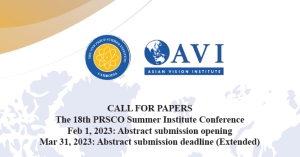

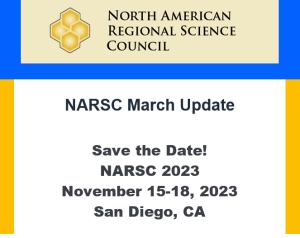

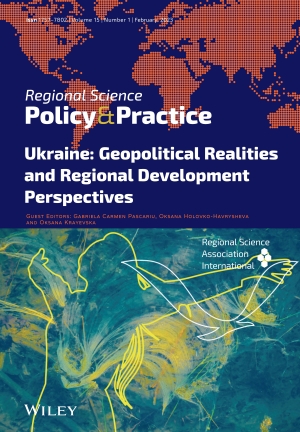
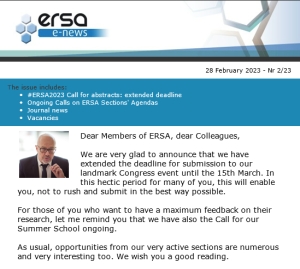

 Dear Members of ERSA, dear Colleagues,
Dear Members of ERSA, dear Colleagues,





 36th ERSA Summer School
36th ERSA Summer School Call for searching for new President and Vice-President of ERSA.
Call for searching for new President and Vice-President of ERSA. 



 VI Seminar for New Academic Researchers
VI Seminar for New Academic Researchers




